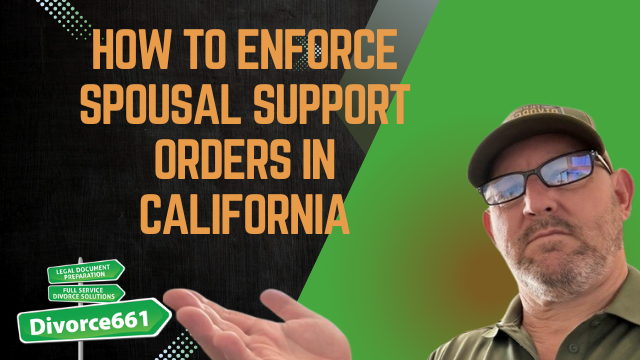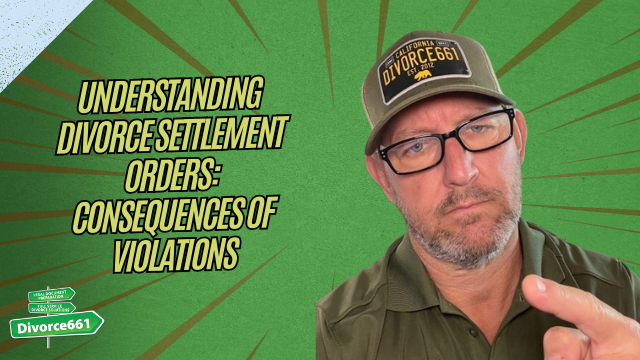How to Enforce Spousal Support Orders in California
I’m Tim Blankenship with Divorce661. If you have a court-ordered spousal support (alimony) obligation in California and your ex isn’t paying, you have legal remedies. In this post I’ll walk you through the practical steps the court can take to make sure support is paid, explain your enforcement options, and share a real client example of how enforcement worked in practice.
Why enforcement matters
Spousal support orders carry legal weight. They aren’t just suggestions — they’re enforceable judgments. When payments stop, you don’t have to accept it or try to handle collection on your own. California law gives you several tools to collect past-due support and ensure ongoing payments.
Common enforcement tools the court can use
- Wage garnishment (wage assignment): The court can issue an order directing the payer’s employer to withhold a portion of wages and send it directly to you.
- Interest on arrears: Courts can order interest to be charged on unpaid support amounts, which discourages nonpayment and compensates for delays.
- Contempt of court: If a payer wilfully refuses to obey a support order, the court can hold them in contempt. Contempt can result in fines or jail in extreme cases, and it often motivates compliance.
- Coordination with enforcement agencies: If child support enforcement is involved, the Department of Child Support Services (DCSS) can sometimes assist with spousal support enforcement, depending on the situation.
Step-by-step: What to do if you’re not receiving support
- Document missed payments. Keep copies of the court order and a clear record of missed or late payments (bank statements, canceled checks, emails, or texts).
- Prepare enforcement paperwork. File a request to enforce the order with the family court that issued the support order. The exact form and process can vary, so check local court rules or get help preparing the documents.
- Request specific relief. Ask the court for a wage assignment, interest on arrears, and any other appropriate remedies. If you believe the nonpayment is intentional, request a contempt hearing.
- Attend the hearing. Bring your documentation and be prepared to explain the payment history to the judge. The court will review the evidence and decide which enforcement measures to issue.
- Follow up on orders. If the court orders wage garnishment or other remedies, make sure those orders are served on employers or agencies so payments start flowing.
Real client story
We recently helped a client whose ex stopped paying support after losing a job. The client thought there wasn’t much they could do. We filed the enforcement paperwork with the court, and after review the court issued a wage assignment through the ex’s new employer. As a result, payments resumed automatically. This is a great example of how enforcement can be fast and effective when you follow the right steps.
When to consider contempt
Contempt is a powerful remedy but best used when the non-paying spouse is intentionally refusing to comply. If the payer claims inability to pay (for example, job loss), the court will look at whether the claim is legitimate. Courts are typically more willing to order wage garnishments or other remedies when the payer has the ability to pay but chooses not to.
How Divorce661 can help
- We prepare and file enforcement paperwork correctly so your request is clear and persuasive to the court.
- We can request wage assignments and coordinate service on employers to restart automatic payments.
- If child support services are involved, we can help coordinate efforts with the Department of Child Support Services.
- We offer flat-fee divorce and spousal support services and provide straightforward guidance through the enforcement process.
Next steps
If you have a spousal support order and payments have stopped, don’t wait. Gather your documentation (court order and records of missed payments) and take action to have the court enforce the order.
For a free consultation about enforcing your spousal support order, visit Divorce661.com or schedule a free phone consultation at Divorce661.com/divorce661-consultation/. We’ll review your situation and help you take the right steps to collect what you’re legally owed.
Final thoughts
Enforcement options like wage garnishment, interest on arrears, and contempt are designed to make support orders effective. Courts can and do take nonpayment seriously — and with the right documentation and strategy, you can get support payments back on track.
“If support is court-ordered and not being paid, you can file a request to enforce the order. The court can step in by issuing a wage garnishment, charging interest on unpaid amounts, or even holding the non-paying spouse in contempt.”


